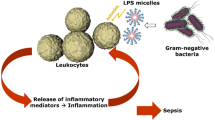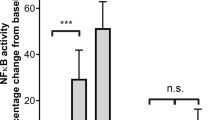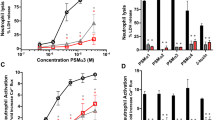Abstract
It has generally been assumed that resistance of animals to the pyrogenic and lethal effects of bacterial endotoxin is largely dependent on the phagocytic capacity of the reticulo-endothelial system. Thus it has been shown that stimulation of the reticulo-endothelial system with non-lethal doses of bacterial lipopolysaccharide or endotoxin results in protection of the animals against a subsequent lethal dose of endotoxin1. Again, numerous workers have demonstrated that a ‘blockade’ of the reticulo-endothelial system by colloidal particles, for example saccharated iron oxide, thorotrast and trypan blue, increases the sensitivity of the animals to the lethal effects of these substances2. Recently, however, it has been shown that in certain circumstances it is possible for mice to possess an increased phagocytic activity, as measured by their ability to clear colloidal carbon, and yet be highly sensitive to the effects of endotoxin. This can be seen during the course of an intracellular infection3, or following the administration of zymosan4. The apparent contradiction of these results has yet to be resolved, and it is not unlikely that such resolution may lead to an elucidation of the mode of action of the endotoxins.
This is a preview of subscription content, access via your institution
Access options
Subscribe to this journal
Receive 51 print issues and online access
$199.00 per year
only $3.90 per issue
Buy this article
- Purchase on Springer Link
- Instant access to full article PDF
Prices may be subject to local taxes which are calculated during checkout
Similar content being viewed by others
References
Biozzi, G., Benacerraf, B., and Halpern, B. N., Brit. J. Exp. Path., 36, 226 (1955).
Bennett, I. L., Proc. Soc. Exp. Biol. N.Y., 81, 248 (1952). Good, R. A., and Thomas, L., J. Exp. Med., 97, 871 (1953).
Howard, J. G., Biozzi, G., Halpern, B. N., Stiffel, C., and Mouton, D., Brit. J. Exp. Path., 40, 281 (1959). Abernathy, R. S., Bradley, G. M., and Spink, W. W., J. Immunol., 81, 271 (1958).
Benacerraf, B., Thorbecke, G. J., and Jacoby, D., Proc. Soc. Exp. Biol., N.Y., 100, 796 (1959).
Stuart, A. E., Biozzi, G., Stiffel, C., Halpern, B. N., and Mouton, D., C.R. Acad. Sci., Paris, 250, 2779 (1960).
Stuart, A. E., et al., Brit. J. Exp. Path., 41, 599 (1960).
Halpern, B. N., Biozzi, G., Mene, G., and Benacerraf, B., Ann. Inst. Past., 80, 582 (1951).
Litchfield, J. T., and Wilcoxon, F., J. Pharm. Exp. Therap., 96, 99 (1949).
Noyes, H. E., McInturf, C. R., and Blahuta, G. J. B., Proc. Soc. Exp. Biol., N.Y., 100, 65 (1959).
Freedman, H. H., Ann. N.Y. Acad. Sci., 88, 99 (1960).
Author information
Authors and Affiliations
Rights and permissions
About this article
Cite this article
COOPER, G., STUART, A. Sensitivity of Mice to Bacterial Lipopolysaccharide following Alteration of Activity of the Reticulo-endothelial System. Nature 191, 294–295 (1961). https://doi.org/10.1038/191294a0
Issue Date:
DOI: https://doi.org/10.1038/191294a0
This article is cited by
-
Strahlenschutzwirkung von �thylstearat
Die Naturwissenschaften (1963)
Comments
By submitting a comment you agree to abide by our Terms and Community Guidelines. If you find something abusive or that does not comply with our terms or guidelines please flag it as inappropriate.



